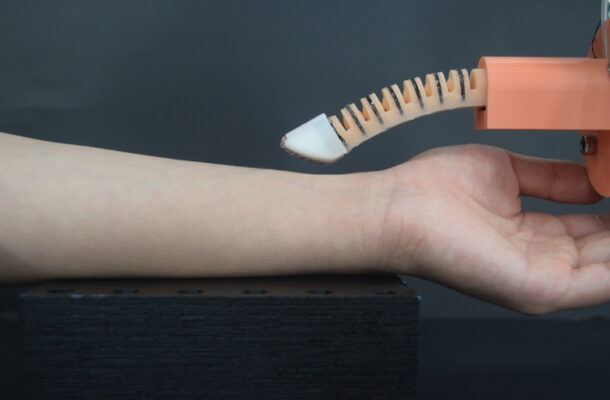Chinese scientists have developed a highly sensitive robotic finger capable of detecting breast cancer and other diseases early, offering new possibil
Chinese scientists have developed a highly sensitive robotic finger capable of detecting breast cancer and other diseases early, offering new possibilities for medical diagnostics.
Introduction
In a significant medical breakthrough, Chinese researchers have developed an ultra-sensitive robotic finger that could revolutionize the early detection of diseases such as breast cancer. Created by scientists at the University of Science and Technology of China, this innovative device possesses an advanced sense of touch, capable of detecting abnormalities in the human body. Dubbed the “robo-doctor,” the robotic finger holds promise for enhancing healthcare in regions with limited medical resources and could transform the way doctors diagnose patients in the future.
A New Era of Medical Diagnostics: The “Robot Finger”
The “robot finger” technology is designed to perform precise physical examinations, measuring a patient’s pulse and detecting abnormal glands. Its creators at the University of Science and Technology of China envision this as the foundation of a robotic hand that could one day replace routine checks conducted by doctors.
Hongbo Wang, one of the lead researchers involved in the project, highlighted the potential of this technology in underdeveloped areas where there is a lack of healthcare workers. “Combined with intelligence, robotic examination and diagnosis can be achieved, which can greatly benefit regions where healthcare services are scarce,” said Wang. The ultimate goal is to combine this robotic finger with an artificial arm, powered by artificial muscles, to fully mimic the functionality of human hands.
Early Detection of Breast Cancer: A Game-Changer
One of the most promising aspects of this technology is its potential to detect diseases like breast cancer early. Early detection is crucial in the successful treatment of breast cancer, and the ultra-sensitive robotic finger could help doctors spot irregularities before they develop into serious health issues.
Routine physical examinations can be uncomfortable for some patients, but this new device offers a more comfortable alternative, potentially easing patient anxiety during check-ups. The delicate yet precise nature of the robotic finger allows it to sense abnormalities that might go unnoticed by the human touch, providing doctors with an additional tool for early diagnosis.
Technology Designed for Delicate Medical Applications
While similar devices already exist, researchers note that current models are often too rigid for the sensitive and intricate tasks required in medical examinations. The newly developed robotic finger, however, has been designed specifically to address these challenges. It combines flexibility and sensitivity, making it ideal for tasks that require a delicate touch, such as detecting lumps or abnormalities during a physical exam.
The team behind the project hopes that further development will lead to a fully intelligent robotic hand, capable of performing complex medical functions, such as diagnosing patients and carrying out examinations autonomously. This would represent a major advancement in healthcare technology, providing a scalable solution for regions with limited access to skilled medical professionals.
Beyond Healthcare: Additional Capabilities of the Robotic Finger
In addition to its medical applications, the robotic finger has demonstrated other impressive capabilities. According to the research team, the device can even write words such as “chkemi,” showcasing its dexterity and potential for other practical uses. The versatility of the robotic finger suggests that it could be adapted for a wide range of tasks beyond the medical field.
Conclusion
The development of the ultra-sensitive robotic finger by Chinese scientists marks an exciting leap forward in medical technology. By enhancing the precision and comfort of physical examinations, this innovation could play a key role in the early detection of diseases like breast cancer. As researchers continue to refine the technology, the possibility of a fully autonomous “robo-doctor” becomes ever more realistic. With its potential to improve healthcare access in underserved areas and its ability to perform delicate medical tasks, the robotic finger represents a promising future for medical diagnostics.

COMMENTS